
|
HIDDEN TREASURES
The mysterious story of Gunner's Heaven
What you're about to read, viewers, is the
semi-enthralling tale of a tireless investigative journalist's lonely and
dogged quest for ultimate truth and justice in a world of confusion and
lies, combined with a eulogy to one of the finest games ever published.
But first, a little background.
Videogaming is a cultural form incredibly
badly-served by reliable historical documentation. There's no videogame
equivalent of the British Library, no depository where every single new
title released can be recorded for posterity with authentic and verified
information. The vast majority of reference information about games is
held in unofficial fansites on the internet, where dubious or outright
wrong facts are presented as unquestionable truth, and where 95% of the
information published is about 5% of the games which have ever been
released. You can find a thousand websites about Pokemon or Final Fantasy
or Street Fighter 2 at the drop of a hat (though since 992 of them will
totally contradict themselves and each other, that doesn't actually make
locating definitive truth substantially easier), but spend hours, days and
weeks searching in vain for the most basic data about the release year of
some semi-obscure Japanese Saturn football game.
(The one exception to this rule is cheats -
name just about any game ever, and the first 100 Google results for it
will be pointless crappy popup-riddled cheat sites, all containing the
exact same untested cheats that all the other sites also nicked from
Gamefaqs in the first place, and which everyone who wants will just go to
Gamefaqs for anyway, rendering all the other sites a massive global waste
of bandwidth that all their 14-year-old webmasters should be clipped round
the ear and sent to bed without any tea for.)
(A case in point - almost every cheat site
quotes the same cheat mode for the Japanese game we're about to discuss
and its 50Hz PAL version, even though the Jap cheat code doesn't
work in the European release. But anyway.)
Nowhere is this information gap more
lamented by your correspondent than in the case of Gunner's Heaven. One of
the first games released for the original Playstation, it also remains one
of the greatest games ever created for that or any other console. An
all-action arcade shoot-'em-up with minor platforming elements in the vein
of Treasure's belatedly-famous Gunstar Heroes (a game now universally
regarded as a work of genius, but
dismissed as generic
mediocrity at the time by
everyone
except
your reviewer), Gunner's
Heaven is in fact so
similar to Gunstar
Heroes, in so many ways, that it's almost impossible to imagine that it
isn't the work of the same authors. But is it?
Nobody knows.
Gunner's Heaven was released in 1995 in
Japan by Sony Computer Entertainment, and the game is credited in the
title sequence to Media Vision, who also wrote games like the RPGs Wild
Arms and Wild Arms 3. (Oddly, Wild Arms 2 appears to have been written by
someone else entirely). It's symptomatic of the sort of InfoGaps that this
article is partly concerned with that searching on Gamefaqs turns up just
three known games by Media Vision in 11 years, none of which is Gunner's
Heaven. (The third being the Xbox rodent-based puzzler Sneakers.)
The notoriously-unreliable MobyGames (which
inexplicably
credits your reporter with work on Duke Nukem Advance, Carmageddon
2000, Activision's remake of Space Invaders and Jackie Chan Adventures:
Legend Of The Dark Hand, in addition to the two games he actually DID work
on in reality) produces another couple of results - a fantasy space
adventure and an educational gardening game, both on the PC - but again,
there's no mention of Gunner's Heaven, as either publisher or developer.
Searching the wider internet brings up
little but a vast and impenetrable mass of unimaginatively-named companies
going under the same moniker, and an unconfirmed report that the developer
also produced the 1994 Playstation RPG Crime Crackers. All of the supposed
games-industry reference sites miss out whole bunches of the 24
known official Treasure titles. (The ever-laughable Spong hasn't
heard of anything before Radiant Silvergun.) So much for the net.
Clearly, your intrepid fact-hound is on his own.
The most plausible justification for the
conviction that Gunner's Heaven is the unbilled work of Treasure comes
from simply playing it. The briefest of runs through the respective
opening levels of this game and Gunstar Heroes will give any gamer the
distinct impression that they were written by the same hand. The four
different weapons (normal shot, lasers, homing beams, flamethrowers); the
crouch-and-slide attack; the way you throw opponents rather than shooting
them if you get really close; the mid- and end-level bosses with numeric
strength gauges; the hordes of little round diagonal-laser-firing
hoverbots combined with loads of cannon-fodder soldiers and a few tougher
enemies requiring multiple hits; the way your character hangs one-handed
from the underside of platforms, able to fire or shimmy along them, but
not at the same time; your single life with large replenishable energy
bar; but mostly just the sheer joyful pyrotechnic carnage. If these two
games weren't made by the same people, then one of them, frankly, is the
most unabashed, unashamed piece of blatant plagiarism in the history of
gaming.
That impression only gets stronger in later
levels, as both games - for example - throw auto-scrolling levels
featuring giant trains at you, or Rainbow Islands-ish vertical stages
where you have to leap up a series of platforms without falling off the
bottom of the screen. Only Gunstar Heroes' trademark "boardgame" final
section doesn't find a parallel in Gunner's Heaven, presumably on the
grounds that that would be taking things just too far. (Heaven has
its own unique sections too, like the jet-pack aerial battle stage, and
also takes advantage of the Playstation's extra power to do things beyond
the capability of the humble Mega Drive, particularly with regard to some
gigantic sprites and explosion effects.)
There are other, more nebulous, Treasure
signatures here too. The two characters (see also Bangai-o, Mischief
Makers, etc); the two-word title (like Alien Soldier, Dynamite Headdy,
Light Crusader, Radiant Silvergun, Rakugaki Showtime, Stretch Panic, Freak
Out) starting with the same letters (GH) as Treasure's other games of the
era, Gunstar and Guardian Heroes (Treasure have always had something of an
obsession with two - see the black-and-white core dynamic of Ikaruga or
Silhouette Mirage, for example); the highly distinctive style of the
cutscene graphics and the character animation.
Of course, none of this amounts to
conclusive proof, and we've established the uselessness of the internet as
a videogaming-history research tool already. So how to find out? Games mag
Edge interviewed Treasure in Japan in 2001, but when your reporter found
out and contacted the Edge team to get them to ask the developer once and
for all whether they were responsible for Gunner's Heaven or not, the
interview had already taken place and nobody from Edge could be bothered
to ring them up again and get either a confirmation or a denial. The
sloppy amateurs.
The next cunning plan was to complete the
game and see whose names showed up on the closing credits sequence.
Unfortunately - and quite rarely for a Japanese title - it turns out that
all the in-game text, including the end credits, is in kanji, leaving
Western eyes none the wiser.
But wait! A quick(ish) 200MB eMule download
later and suddenly there's also the option of completing the PAL version,
Rapid Reload. Tragically, that's hampered by the fact that the handy cheat
mode of the Japanese game doesn't work on it, and the first time your
reporter ever finished the game properly it took about 16 gruelling hours
(you get infinite continues, but every time you die you have to restart
the current level from immediately after the last-defeated boss, so it's
not just a Metal Slug-style case of "buying" your way to the end) and to
be honest your reporter doesn't want to know that badly. Or does he?
A lengthy search eventually reveals that
some clever soul has written an Action Replay
plugin for the Playstation emulator
ePSXe, and while Rapid Reload doesn't have a cheat mode, it
does have some Action Replay codes. A study of the pidgin-English
readme seems to make operation of the plugin clear enough, and after a bit
of trial and error Alex and Ruka are equipped with infinite energy.
Result! End sequence here we come!
Except that in this case, "infinite" means
"until the end of Stage One". As soon as the second level starts, our hero
and heroine are somehow as vulnerable as drunk kittens again, so it's back
to the old Action Replay codes to add infinite bombs and weapon energy as
well, and then start from the beginning again, sledgehammering our way to
the end by simply smart-bombing any enemy with the temerity to show its
face on screen. Which is a fine and dandy plan until Stage Five, when the
infinite smart bombs inexplicably and quietly stop working too, leaving
our protagonists with none just as they reach the unbelievably evil
end-of-stage boss. Unpleasantly, Rapid Reload - unlike the Japanese
release - limits the player to nine credits, and without a lot of extra
smart bombs that's not going to get us past the Stage Five boss, so (hnngghh)
it's back to the start
again.
Your correspondent's a little weary by now,
so scans through the ePSXe manual and realises that it has a built-in
save-state function which could make life a good deal easier. So off we go
once more, judiciously quicksaving every time a tricky enemy is passed
without loss of life, and eventually it's time to face the Stage Five boss
again, but now with a dozen carefully-saved smart bombs in our pocket. It
still takes 20 or so attempts to survive through the boss's blizzard of
seemingly-undodgeable fire, including one particularly galling moment when
the boss and Alex die at the same moment, and though the game looks as if
it's going to allow play to continue, it decides at the last moment that
we've actually failed and must try again. Sigh.
A few more attempts, though, and the boss is
beaten, this time with energy to spare. Breathing a sigh of relief, your
exhausted reporter hits the quicksave button to consign this Beelzebub of
a boss to history. Except in a daze of confusion, some idiot accidentally
hits the quickload button instead, and can only gape in horror as
all the previous good work is undone in a fraction of a second of
rock-brained stupidity, and the boss has to be tackled yet again.
Third time round, with the aid of a Post-It
note stuck to the screen to remind the terminally thick-witted player
which button is which, Stage Five is safely cleared and saved, leaving
only the climactic final battle to fight, though it's going to have to be
tackled without any smart bombs left. Thankfully the final guardian is
more learnable and less unfair than the previous boss, and it's the work
of a mere 10 minutes or so - and some more judicious quicksaving - to send
him packing and enjoy, in English, the comedy twist at the end of the
story. All that remains now is to watch the translated version of the end
credits, note the names, and see, by cunningly cross-referencing them with
the end credits of other games, how many of them are connected to
Treasure, hence finally discerning whether Gunner's Heaven is a lost
Treasure classic or merely a scandalously flagrant rip-off by someone else
entirely.
Except the credits aren't translated.
Yes, out of the entire 380 megabytes of
program code, the ONLY words that nobody's bothered to translate into
English are the ones we want to read. At a painfully slow pace that seems
to be openly gloating right in our player's face, the Cast and Staff lists
scroll up the screen in the same kanji as the original version. Your
reporter weeps quietly, then calmly makes several additions to his
when-the-revolution-comes up-against-the-wall list. Near the top.
So at the end of it all, after several hours
of dedicated effort, on top of all the years previously spent trying
to solve this historical enigma, the world's videogame lovers STILL have
no idea whether Gunner's Heaven/Rapid Reload is a Treasure game or not.
But here's the thing:
Who cares?
And yes, that is an odd rhetorical
question to arrive at after the shenanigans described above. But the truth
of the matter is that Gunner's Heaven is such a glorious game that if you
need it to be the work of a "cool" developer in order to enjoy it, you
need your brain rinsing out with bleach. (Rapid Reload - by virtue of its
lazy, half-arsed, thick-bordered PAL conversion - is somewhat less so, but
is still well worth seeking out if you've got no way of playing Japanese
PS1 discs. Running either image-file in a PS emulator, incidentally,
produces minor graphical glitches in some of the levels and some
occasional slight slowdown, but nothing which detracts significantly from
playability.)
If you loved Gunstar Heroes (and you should
have), this is a game that's extremely similar, but in several ways
even better. It's faster and more action-packed than Gunstar, and with
slicker, more responsive controls. (Also you get a grappling-hook gun,
which is entirely unnecessary for completing the game but a lot of fun to
show off with.) On the other hand it's a touch less sophisticated and not
quite as inventive as the Mega Drive game, but you'll be too busy grinning
like a loony at the constantly explosion-filled screen to either notice or
care very much about that.
Gunner's Heaven predates
Metal Slug by a year, and it
single-handedly blazed the trail for the survival of the 2D shooting
platform game in a world that seemed to have left the genre behind. (Also,
not being an arcade game it didn't have to bow to Metal Slug's need to
constantly kill the player and suck more coins out of his pocket, but it's
no pushover for all that - indeed, being sent back to the start of a
section when you die makes Gunner's Heaven considerably the more
challenging game in a home context, where there's no chance of running out
of cash just as you reach the end.) But if we've learned one thing from
these words, it's that its cultural impact doesn't really matter a dang.
Don't play this game because of who wrote - or might have written - it.
Play it because it's brilliant. This is truly where all good gunners go
when they die.
Comments? WoS Forum
|
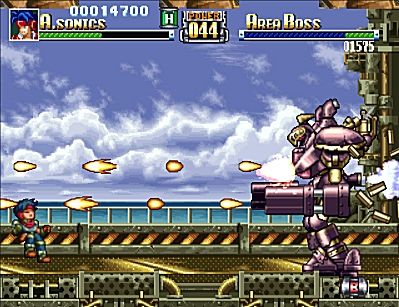
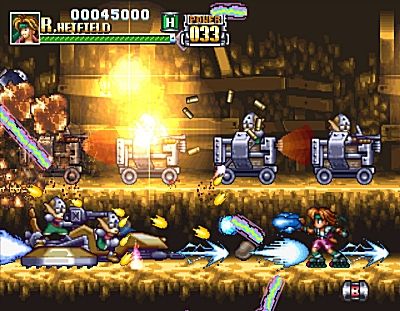
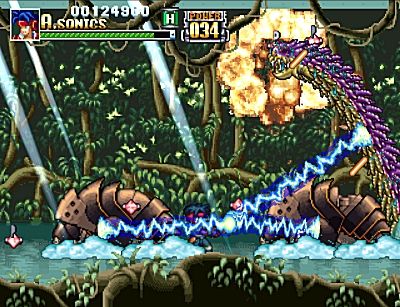
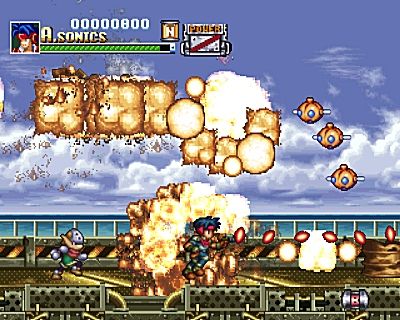
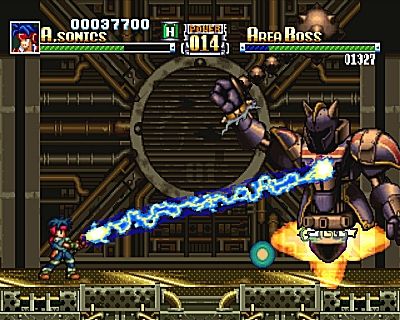
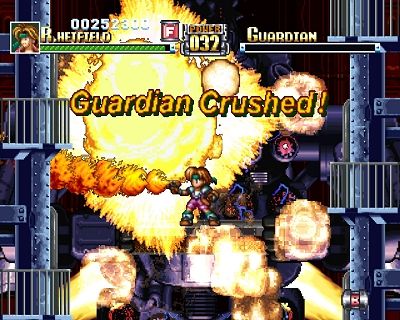
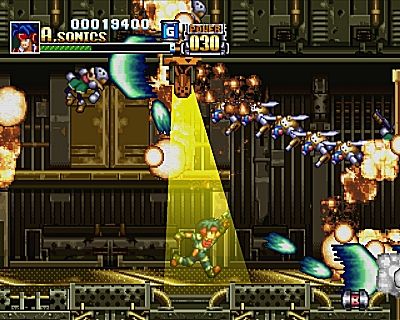
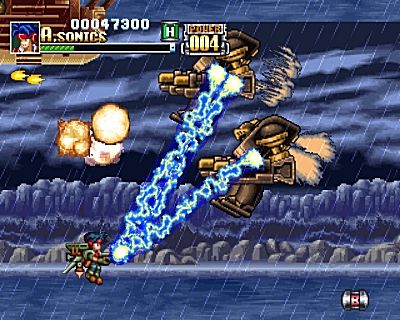
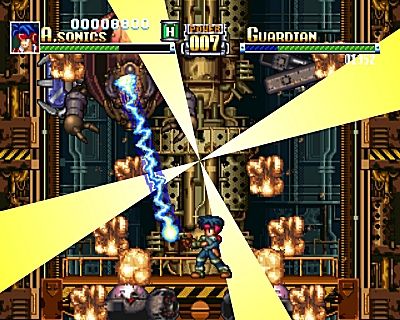
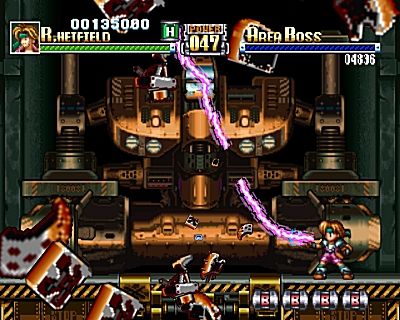
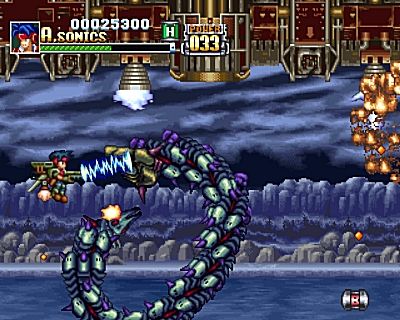
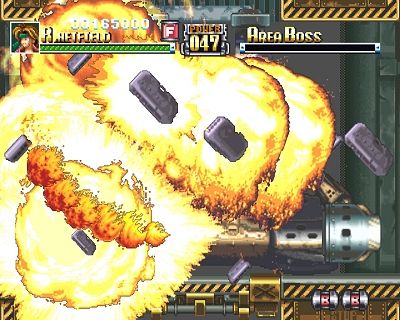
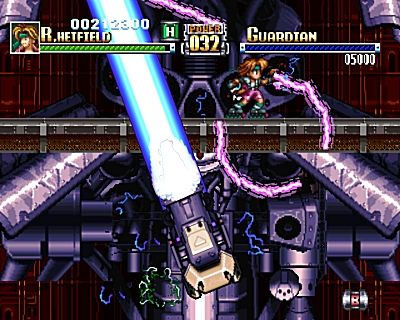
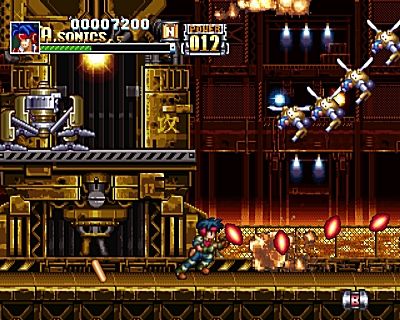
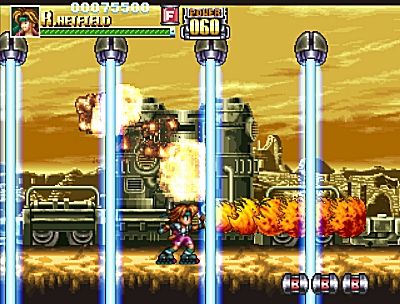
|